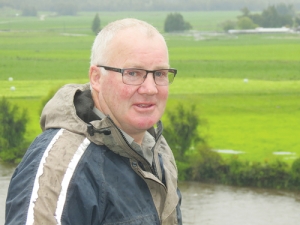Simon Upton urges cross-party consensus on New Zealand environmental goals
Parliamentary Commissioner for the Environment Simon Upton is calling for cross-party consensus on the country's overarching environmental goals.
 Westland Milk Products chair Matt O’Regan says the co-op was dedicated to helping clean up Lake Brunner.
Westland Milk Products chair Matt O’Regan says the co-op was dedicated to helping clean up Lake Brunner.
Bucking public perception of dirty dairying – fanned by environmental groups and mainstream media reporting – West Coast dairy farmers have played a big part in cleaning up the biggest waterway in the region.
A huge commitment by local farmers, community groups, and government agencies has seen water quality targets for the West Coast's largest lake reached five years earlier than planned.
Environment Minister Nick Smith was on the shores of Lake Brunner / Te Kotuku Whakaoka in early December to help celebrate the achievement.
"The success of the programme to restore the water quality of Lake Brunner is an example of how community, regulatory and business interests can come together to produce an excellent result for the environment," West Coast Regional Council chair Andrew Robb says.
"The result is also a win for lake users and the reputation of New Zealand's farm products in overseas markets."
Robb says the regional council and its partners set a target for water quality that was not expected to be reached until 2020.
"Thanks to huge cooperation by the community and farmers, especially the Brunner catchment shareholders of Westland Milk Products, we achieved that target this year."
Robb says water quality monitoring in Lake Brunner had indicated deteriorating trends for nutrients and water clarity. Of most concern were the levels of phosphorous in the lake, traced mainly to runoff from surrounding farmland.
From the early 2000s, the regional council worked with farmers to improve water quality, focusing on compliance with regional council rules and improving farm practices
"The enthusiasm and financial commitment from farmers was a major success factor, especially in dairying, where the installation of effluent containment systems cost some farmers up to $300,000 per farm," Robb says.
Community and iwi groups also stepped up, helping with riparian planting in public areas.
Robb says the work done in the Lake Brunner catchment shows that a balance can be achieved between using the region's natural resources and at the same time maintaining and improving special places for the enjoyment of future generations.
Westland Milk Products chair Matt O'Regan says the co-op was dedicated to helping the Lake Brunner water quality programme.
"With the council, Westland Milk helped identify that land disturbance, fertiliser application regimes and effluent management were contributing to the phosphorus build-up in Lake Brunner. As a result, the West Coast Regional Council updated the rules in its regional land plan and farms in the catchment are now subject to the strictest regulations in the region.
"Westland's farmers then focussed on preventing direct discharge of effluent into waterways, improving fertiliser management and preventing stock access to waterways."
Each dairy farmer had to put in a land-based, low application-rate effluent disposal system and/or adopt a direct drilling regime for applying waste directly into the soil. Additionally, many farms built new sealed holding ponds for effluent and re-visited their fertiliser regime.
O'Regan says a lot of emphasis went on containment of effluent, ensuring ponds and tanks were sealed with no leakage to ground or surface water.
"Westland supported this initiative by having its environment manager visit each Brunner catchment shareholder and work with them to draw up individual farm management plans to help them comply."
O'Regan and Robb say farmers joined the efforts with enthusiasm, many going well beyond the minimum regional requirements.
In addition to new plant, many spent heavily on riparian fencing and planting, and installing stock crossings over waterways.
Contributors to the project included the Ministry for the Environment, AgResearch, Landcare Trust, NIWA and DairyNZ.
Additional reductions to costs for forest owners in the Emissions Trading Scheme Registry (ETS) have been announced by the Government.
Animal welfare is of paramount importance to New Zealand's dairy industry, with consumers increasingly interested in how food is produced, not just the quality of the final product.
Agriculture and Forestry Minister Todd McClay is encouraging farmers and growers to stay up to date with weather warnings and seek support should they need it.
The closure of SH2 Waioweka Gorge could result in significant delays and additional costs for freight customers around the Upper North Island, says Transporting New Zealand.
OPINION: The year has started positively for New Zealand dairy farmers and things are likely to get better.
Ministry for Primary Industries (MPI) Director General Ray Smith believes there is potential for an increase in dairy farming in New Zealand.

OPINION: If the hand-wringing, cravat and bow-tie wearing commentariat of a left-leaning persuasion had any influence on global markets, we'd…
OPINION: With Winston Peters playing politics with the PM's Indian FTA, all eyes will be on Labour who have the…